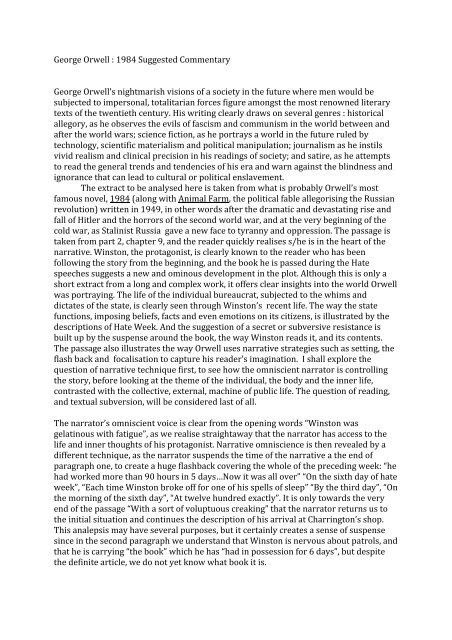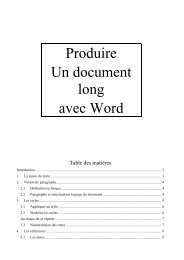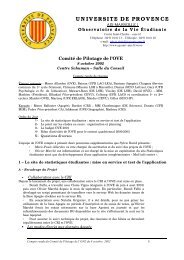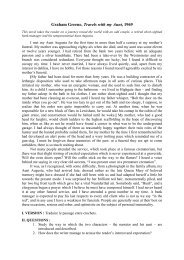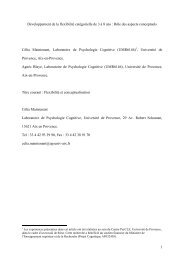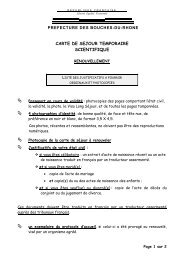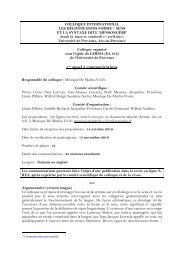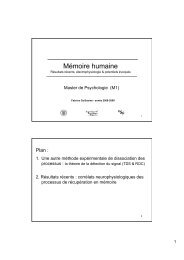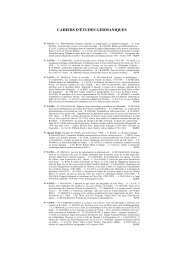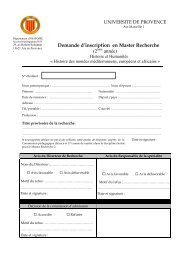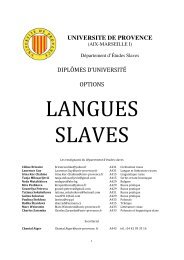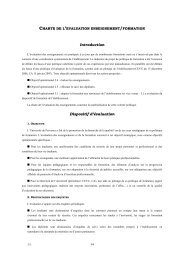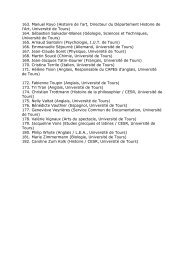George Orwell : 1984 Suggested Commentary George Orwell's ...
George Orwell : 1984 Suggested Commentary George Orwell's ...
George Orwell : 1984 Suggested Commentary George Orwell's ...
- No tags were found...
Create successful ePaper yourself
Turn your PDF publications into a flip-book with our unique Google optimized e-Paper software.
<strong>George</strong> <strong>Orwell</strong> : <strong>1984</strong> <strong>Suggested</strong> <strong>Commentary</strong><strong>George</strong> <strong>Orwell</strong>’s nightmarish visions of a society in the future where men would besubjected to impersonal, totalitarian forces figure amongst the most renowned literarytexts of the twentieth century. His writing clearly draws on several genres : historicalallegory, as he observes the evils of fascism and communism in the world between andafter the world wars; science fiction, as he portrays a world in the future ruled bytechnology, scientific materialism and political manipulation; journalism as he instilsvivid realism and clinical precision in his readings of society; and satire, as he attemptsto read the general trends and tendencies of his era and warn against the blindness andignorance that can lead to cultural or political enslavement.The extract to be analysed here is taken from what is probably <strong>Orwell</strong>’s mostfamous novel, <strong>1984</strong> (along with Animal Farm, the political fable allegorising the Russianrevolution) written in 1949, in other words after the dramatic and devastating rise andfall of Hitler and the horrors of the second world war, and at the very beginning of thecold war, as Stalinist Russia gave a new face to tyranny and oppression. The passage istaken from part 2, chapter 9, and the reader quickly realises s/he is in the heart of thenarrative. Winston, the protagonist, is clearly known to the reader who has beenfollowing the story from the beginning, and the book he is passed during the Hatespeeches suggests a new and ominous development in the plot. Although this is only ashort extract from a long and complex work, it offers clear insights into the world <strong>Orwell</strong>was portraying. The life of the individual bureaucrat, subjected to the whims anddictates of the state, is clearly seen through Winston’s recent life. The way the statefunctions, imposing beliefs, facts and even emotions on its citizens, is illustrated by thedescriptions of Hate Week. And the suggestion of a secret or subversive resistance isbuilt up by the suspense around the book, the way Winston reads it, and its contents.The passage also illustrates the way <strong>Orwell</strong> uses narrative strategies such as setting, theflash back and focalisation to capture his reader’s imagination. I shall explore thequestion of narrative technique first, to see how the omniscient narrator is controllingthe story, before looking at the theme of the individual, the body and the inner life,contrasted with the collective, external, machine of public life. The question of reading,and textual subversion, will be considered last of all.The narrator’s omniscient voice is clear from the opening words “Winston wasgelatinous with fatigue”, as we realise straightaway that the narrator has access to thelife and inner thoughts of his protagonist. Narrative omniscience is then revealed by adifferent technique, as the narrator suspends the time of the narrative a the end ofparagraph one, to create a huge flashback covering the whole of the preceding week: “hehad worked more than 90 hours in 5 days…Now it was all over” “On the sixth day of hateweek”, “Each time Winston broke off for one of his spells of sleep” “By the third day”, “Onthe morning of the sixth day”, “At twelve hundred exactly”. It is only towards the veryend of the passage “With a sort of voluptuous creaking” that the narrator returns us tothe initial situation and continues the description of his arrival at Charrington’s shop.This analepsis may have several purposes, but it certainly creates a sense of suspensesince in the second paragraph we understand that Winston is nervous about patrols, andthat he is carrying “the book” which he has “had in possession for 6 days”, but despitethe definite article, we do not yet know what book it is.
The flashback not only describes the nightmarish behaviour of the crowd, but narratesthe intriguing encounter during which Winston is passed the book (“a man whose facehe did not see had tapped him on the shoulder”. And Winston’s instant understandingthat “it would be days before he had an opportunity to look inside it” only makes sensewhen we realise that as a result of state affairs, the workers from the Ministry will berequired to rewrite history. The delay caused by the flashback also allows the reader tounderstand better why Winston feels so utterly exhausted, and can also help explainwhy the sensation of reading gives him such sensations of delight.The extract from the book he reads is another means by which the narrator shifts hisvoice and his position in the text. As soon as the reader reaches the words “The theoryand practice of Oligarchical Collectivism” they know that they are now in a text withinthe text, reading the exact words Winston is reading, and that a different narrative voicehas thus taken over. This creates an interesting narrative effect which also enforces thepower of the external narrator who can move in and out of the text. At some points thenarrative voice is absent (in the quoted paragraph from Goldstein’s text), sometimespresent detailing recent events and showing strict control of the plot, and sometimesintimate and secret, as the world is seen through Winston’s eyes, thus encouraging thereader to identify with Winston.Winston is indeed the only character with any psychological depth in this extract. He ispresented as a single, vulnerable, acutely sensitive individual, thus creating a strikingcontrast with the brute force of the crowd he observes during hate week. In the openingparagraph of the extract, he is seen not only as individual, but as almost breaking up, asif his life were draining out of him (“gelatinous” “weakness of a jelly” “frail structure ofnerves, bones and skin”). The reader also has the impression that he is so drained ofenergy that his body ceases to function as a coordinated whole, but as a sum or parts(hand, blood, lymph, shoulders, feet, joints, knee, sin of his leg). When this description iscompared to the massive crowd scene, we see that the crowd too seems to be made ofparts of bodies (white faces, arms, skull, bony arm, ). The reader gradually gains theimpression that the state functions by taking over the very bodies of the people, as ifthey have no independent physical existence. In Winston’s case, however, he seemsacutely aware of what the state is doing to him, which we can later link to his role as asubversive voice or presence in the state machine.The description of the crowd scene also insists on Winston’s separation or hisdifference from those around him. It is through his eyes that the reader sees theimmense crowd packing a London square (several thousand people, a thousandchildren, thousands of throats), and the long list of nouns describing the events alsoshows Winston’s position as onlooker not partaking in the rally : “the processions, thespeeches, the shouting, the singing, the banners….”. A similar rhetorical effect ofenumeration (or asyndeton) is achieved some lines later (atrocities, massacres,deportations, lootings, rapings, etc” The effect of such accumulations is double. First itseems to suggest the insistent way in which the speaker himself is drumming home themessage of his speech. Second, it implies that this is how Eurasia functions, overloadingthe senses with highly charged words that seem to enforce a few of reality from whichthere is no escaping. Excess, in any case, seems to be the prime characteristic of Eurasia.Excess because it organises a Hate Week with rallies every day. Excess because of theextreme violence with which political rallies are staged “he gripped the neck of themicrophone …” and the hysterical reactions from the crowd that are being provoked(“delirium”; “feral roars of rage were again bursting from the crowd”) and excess too
ecause facts are being obviously and outrageously deformed and history is beingrewritten in front of everyone’s eyes, yet no‐one, except Winston who stands outsidethis delirium, seems to notice or care.The same division between Winston the lone individual, and the facelesscollective state is present in the descriptions of his workplace (ironically named theMinistry of Truth,) where the use of the passive voice and impersonal structuressuggests the presence of work colleagues submitting to the same intensity and absurdityof work pressures as him, but about which we earn nothing : “no directive was issued, itwas known, were brought up, the first job was to stack, often it was enough tosubstitute”. In fact we learn that “a mighty deed which could never be mentioned hadbeen achieved” thus implying that all personal encounters are avoided because no onecan acknowledge the type of work they have just had to perform, as this would meanacknowledging the massive lies and propaganda produced by and for the state.From the opening of the passage Winston is shown to be intensely sensitive to language(“Gelatinous ws the right word. It had come into his head spontaneously”) but as theextract develops, two very different visions of language emerge. On the one hand there isWinston’s precise, detailed recordings of the appalling scenes around him, and on theother, the violent, excessive rhetoric being used to manipulate the crowds and hypnotizethem (“impossible to listen without being first convinced then maddened”). In this case,the pounding lists of words seem to be emptied of any real semantic value as if nothingreally had any individual meaning any more (rapings, torture, bombings, lyingpropaganda, unjust aggressions, broken treaties ; newspapers, books pamphlets, filmssoundtracks). And indeed when news comes through that foreign policy has changedand Oceania is no longer an enemy but an ally, the speaker can indeed continue speakingin the same manner, with the same words, saying the complete opposite. This atrociousonslaught of words used like weapons is one part of the state’s control of language. Theother part is the coining of barbaric neologisms to name the way language functions. Theonly examples in this passage are the “speakwrite”, some sort of fictional computer andthe “telescreen”, but <strong>Orwell</strong> is famous for having coined other such terms in his novel.This manipulative, and violent use of language then contrasts completely with thepassage when Winston sits down to read (“from somewhere far away there floated thefar shouts of children; in the room itself …the insect voice of the clock…it was bliss”) Inthe safe haven of Mr Charrington’s shop, Winston is shown to be physically at ease,relaxed, comfortable. His body is no longer the burden it was before, but a source ofwell‐being and harmony (the sweet air on his cheek, his feet up on the fender) . Thereader, however, may feel less at ease than Winston. First, we realise that this is a highlydangerous activity (he was alone, …no ear at the keyhole). Second the sense of wellbeing(it was bliss, it was eternity) seem to contrast too starkly with the outside worldfor it to last. Third ,the author of the book, Emmanuel Goldstein, is probably none otherthan the Goldstein named during the crowd seen as the public enemy, so we realise thedangers Winston might be running. Lastly, the actual contents of the book appear to beat odds with the sense of well‐being Winston feels. The harsh, rather blunt style of thetext, and its questionable political codes (“three kinds of people in the world, High,Middle and Low”) and peremptory claims “there have been…essential structure hasnever altered, will always return, …) contrast totally with his sense of happiness. Clearlyreading itself is what he is enjoying rather than the actual text. But <strong>Orwell</strong> does seem tosuggest that the enemies of the state are not necessarily Winston’s potential allies; and ifGoldstein is a subversive state enemy he may be just as dangerous as the state itself. In
this case Winston, and Julia, the only other named character in the extract, are evenmore lonely and vulnerable.The passage is a brilliant illustration of how dystopia works in <strong>Orwell</strong>’s fiction, showinga different world, not so unlike ours (the Hate Week is very reminiscent of Hitler’s publicmeetings) and yet which, having been built as an ideal centrally controlled society wherelives would be better, spirals completely out of control to create the worst nightmareimaginable. <strong>Orwell</strong>’s <strong>1984</strong> is a fictional portrayal of a society gone wrong wherepolitical and historical manipulation have perverted all forms of human life. But like alldystopian satires it is also a chilling warning showing how quickly and easily humanfreedom can be turned into slavery. The year <strong>1984</strong> may have come and gone, but hisnovel is no less relevant today than in was sixty years ago.


